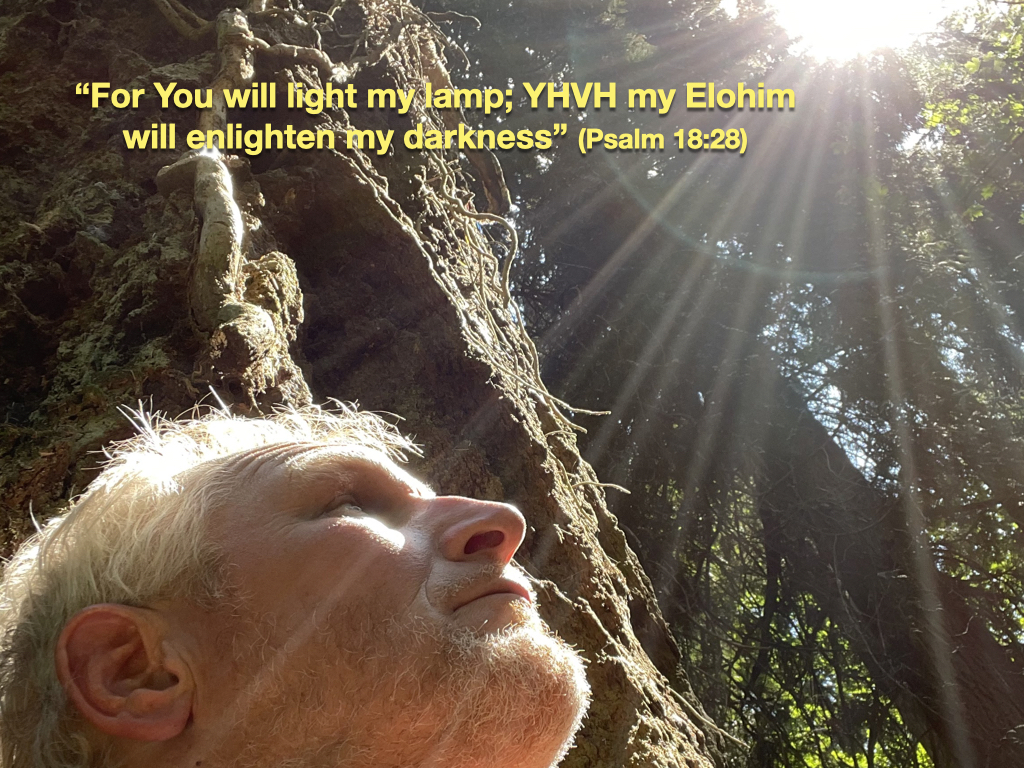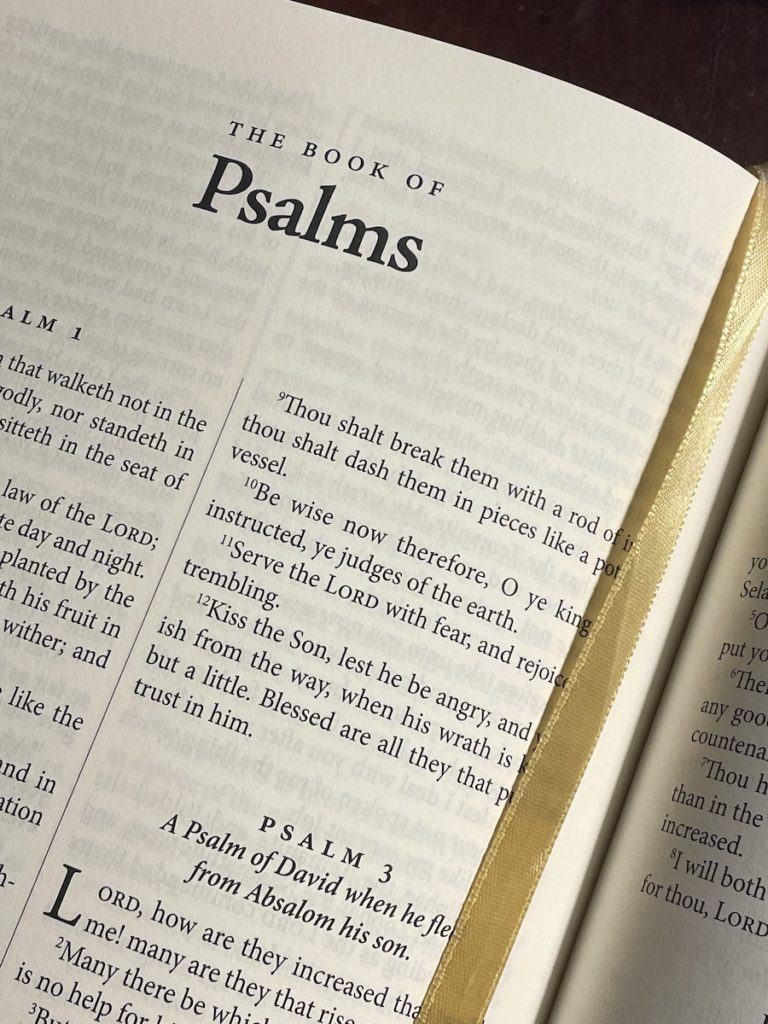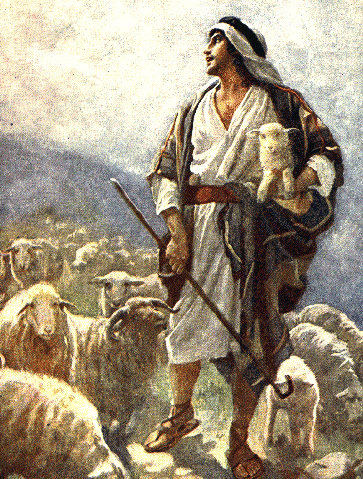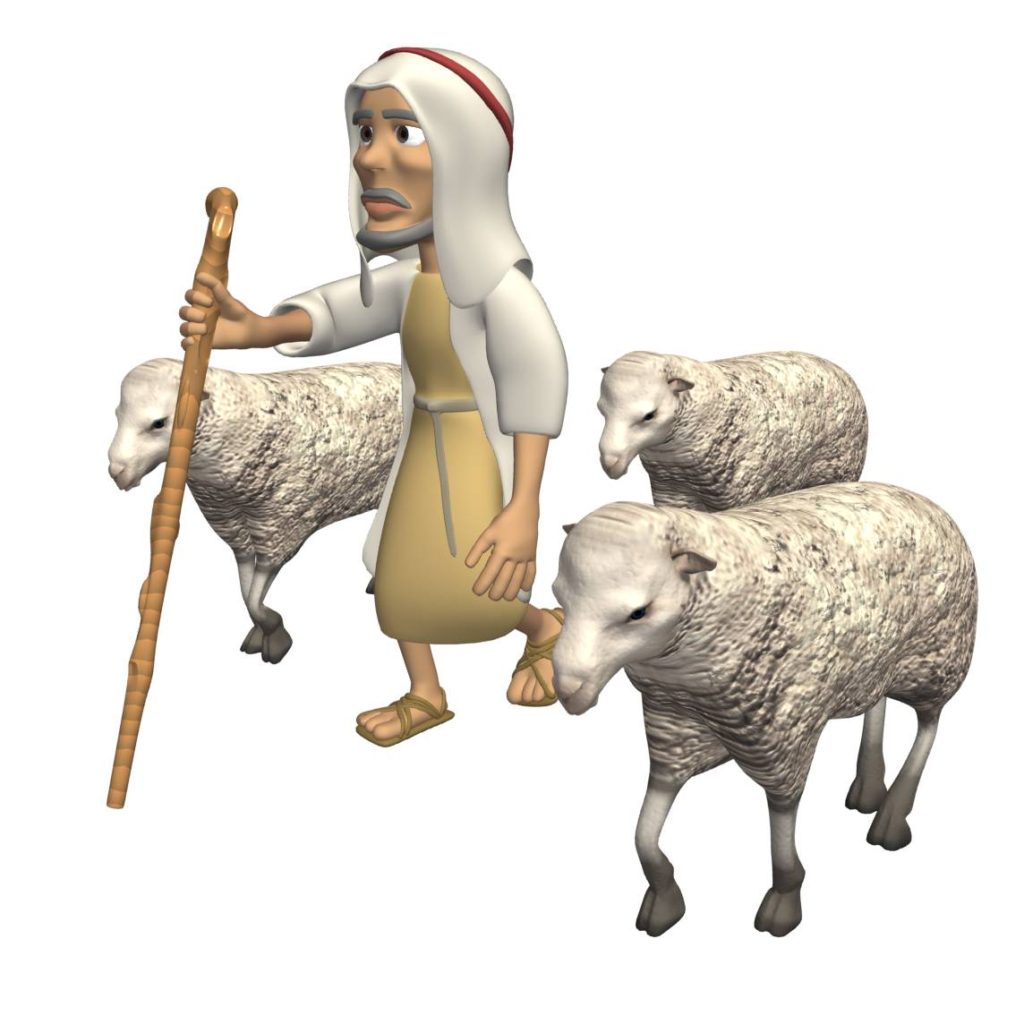
Psalm 23
Natan’s Reflections
David, the author of this psalm, was a literal shepherd of sheep as we all know. This is something that both David and I had in common. This is because I lived on sheep farm from age six to 24, and like David, it was my duty to care for the sheep. We can learn a lot about ourselves and other people when we hang out with sheep. Being a shepherd makes the Bible come alive, since YHVH Yeshua likens his people to sheep, and he is our Good Shepherd who cares for us (John 10:11, 14).

During my time on the family farm, it was my responsibility to care for the sheep including feeding them twice daily, caring for the lambs, protecting the sheep from predators, keeping the gates and fences that surrounded them in good conditions, cleaning their barns, helping the ewes give birth as needed, tending to sick and wounded sheep, leading them from pasture to pasture, shearing them, and finally, butchering them. I have wrestled with sheep, chased them, led them, fed them, fondled them, sheared them and even butchered them. I loved the sheep that were under my care, and to this day, decades later, I still feel a deep, visceral love in my gut when the thought of sheep come to my mind. Whenever I have the opportunity to be around sheep, if they are tame,you will find me out with them fondling their heads and scratching them behind their ears.
Later, I married and became the father of four children and had the opportunity to shepherd my own flock of human sheep. After that, my wife and I started a congregation which I pastored or shepherded (as I like to say) for 18 years where I shepherded “sheeple.”
Here are a few of my reflections on literal sheep and caring for them and how they are like YHVH’s people (or “sheeple”).

- Sheep are defenseless. About all they can do is run from a predator, and they are not fast runners. They will run until they tire out, and then will simply fall down exhausted becoming a hapless victim. When a ewe feels threatened, especially when she has lambs, she will look at you in the eye and stomp her hoof determinately in the ground as it to say, “Don’t come any closer, or I will…do something to you, but I don’t have a clue what….” It is all show, for there is nothing she can do, but hope to out run her attacker. In reality, it’s a pitiful and hopeless situation.
- Sheep are not the most intelligent animal on the farm nor the dumbest, but are somewhere in the between goat and turkeys. Of the animals we had on our farm, our sheep dog was the most intelligent, then the goats, followed by cattle and lastly the sheep. After that came the fowl. In order of intelligence were geese, pigeons, chickens, ducks and the stupidest of all were the turkeys. Frankly, the ducks didn’t seem much smarter, at least to me. Chickens are not much better.
- Sheep are skittish. If they don’t know you, they will not allow you to approach them, but will run off. If they know and trust you, they will allow you to come up to them, or they will come up to you when you call them—especially if they think you have food (e.g. grain). At night, when it was dark and they could not see you, I could walk among them and they would not run away. I would simply let them hear my voice, and they were immediately at ease. This reminds me of the Bible verses where Yeshua, the Good Shepherd said that his sheep here his voice and he calls them by name (John 10:3, 16, 27).
- Sheep will happily and trustingly follow their shepherd whom they know and trust. I trained the sheep to following me from one pasture to another while shaking a bucket of grain. They would follow me single file wherever I led them. There was always a lead sheep—usually the oldest, tamest and smartest ewe. The other sheep knew and trusted this matriarch, and she knew and trusted me knowing that I would lead her to a good pasture. Similarly, Yeshua raises up trusted leaders (shepherds) among his people who have earned their trust, and they follow the leader as he or she follows Yeshua. This is what Paul asked of the saints in Corinth: “Follow [or imitate] me as I follow [or imitate] Messiah,” (1 Cor 11:1).
- Sheep are smelly. Their wool gets all manner of pasture debris (e.g. sticks, dirt and whatever else) caught in it, and they are unable to clean themselves. A sheep pelt (minus the sheep) is not easily cleaned. With the help of much soap and rubbing by hand, it takes a long time to get all of the dirt out that has accumulated since the sheep was last shorn, which occurs once a year—usually in the spring. When the pelt gets wet, it takes days to dry out, since thick wool holds a lot of moisture. This is why Gideon used a wet then a dry sheep fleece as a miraculous test to prove the veracity of the Heavenly Messenger’s word to him (Judg 6:36–40).
- Sheep lead well, but they drive badly. As already noted, sheep will follow a trusted shepherd wherever he leads them. However, if you try to drive a flock of sheep (without the aid of well-trained sheep dogs), each one will flee frantically in as many directions as there sheep. This reminds me of the Bible verses that says without a loving shepherd to lead them, YHVH’s people, like sheep, will scatter (Zech 13:7; Matt 26:7). Sheep need a shepherd, even as we need trusted human leaders, and ultimately Yeshua is the head or Chief Shepherd (1 Pet 5:4) of us all.
- Without a shepherd, sheep will wander. Though I was the shepherd of our flock of sheep, we had fences to keep the sheep contained, so they would not wander. Fences also prevent predators from getting in with the sheep. Similarly, without Yeshua and his Torah-Word to lead, guide and protect us, we, as his sheep, will also go astray, for as we read, “All we like sheep have gone astray; we have turned, every one, to his own way,” (Isa 53:6). Yeshua’s word is like a fence that protects us from the destructive forces of sin, as well as those who would prey on us and lead us astray (e.g. false teachers and shepherds, and Satan himself, who comes as an angel of light to lure us away from the safe pastures of YHVH’s ways of Truth and righteousness that lead to everlasting life).
- In times Bible times, shepherds carried a rod and staff. The rod was a weapon to club predators who might attack the sheep. The staff was to guide and direct the sheep—to keep them in line while moving them from place to place. On our farm, our rod was a gun that we kept at the door, which we used on occasion to protect our sheep from attacking dogs. Our staff were our fences and barns that kept the sheep contained.
- When brought into a new pasture, sheep will gorge themselves with so much fresh grass that sometimes their stomachs will bloat and they will become sick. Invariably, our sheep would get the runs from all the green grass and their rear ends were a greenish mess! As crass as this may sound, I saw the same thing happen many times while pastoring YHVH’s sheeple. People would leave the mainstream Christian church in malnourished, virtually starved condition because they had not been fed well from the whole Word of Elohim including his Torah. About all they knew was that Jesus loved them and that they were saved by his grace. Once the treasures of Torah and the Old Testament were opened up to them, they would gorge themselves on the wonderful knowledge contained there and, in turn, forget about Yeshua and his loving grace. As a result, they would start to eat and devour one another and become spiritually sick. Sheeple can become messed up pretty quickly when fed an unbalanced biblical diet. In some Hebraic circles, this proclivity has given rise to the pejorative term “Messyanics” or “Messy Antics” instead of Messianics.
- Sheep love to be fondled and scratched on the head and behind the ears. Domesticated animals, like sheep, are YHVH’s gift to humans. One of YHVH’s first commands to Adam and Eve was to tend and keep the garden and then to care for and name the animals. Most of our animals (except the chickens) all had names. I grew up around animals, and even our farm animals (we always had a hundred or more of them at any one time) became my pets. I loved them as it was my job to care for them every morning and evening, from birth until the time we had to butcher them to feed our family. Many animals crave for and thrive on human affection and respond affectionately when loved and fondled. We can all relate to household pets like dogs and cats, but sheep, goats and cattle thrive on human affection as well. So do chickens. Have you ever picked up, cradled a hen in your arms while petting it? The sweetest and most mellifluous will flow forth from them as evidence of their happiness. There was much love and affection exchanged between myself and the animals I cared for on the family farm. They looked me as their protector and provider. Their dependence on me was evident, for if I slept in and failed to get up early enough to feed them in the morning, the farm would erupt with a chorus of mooing, baahing to inform me that I was derelict in my dutie.
- Sheep trust their shepherd. I could move freely among the sheep day or night without them fearing me. This was not true of strangers.
- Sheep know the voice of their shepherd even in the night darkness when they cannot see who the person is. As already noted, one word from me, and they were immediately at peace. Similarly, those of us who have a personal relationship with Yeshua, our Chief Shepherd (1 Pet 5:4) have learned to know, trust and long to hear his voice to guide and comfort us as we navigate the rough seas of this life.
- Sheep require a fair amount of care to keep healthy. Their hooves have to be trimmed. They need shearing and deworming. Sometimes they need help giving birth to their young. From time to time and mother will reject its newborn lamb, and so the lamb has to be hand fed until it is able to feed on grass. I had to suckle motherless lambs many times. We would actually bring them into our warm house and keep them there until their wool had grown sufficiently, so that they could endure the cold weather outside without a mother to snuggle up against.
- A shepherd always has to be alert to potential predators attacking his sheep. Even though we had fences and barns for the sheep’s protection, we still kept a watchful eye over them day and night. My bedroom was in the attic of the old farmhouse that my grandfather had built in the early 1920s. I always slept with the window open not only for fresh air, but so that I could hear any worrisome sounds coming from the sheep pasture below. We kept a goat a amongst the sheep who wore a bell. If I heard the goat’s neckbell ringing, this alerted me to the fact that the sheep were running—something that they normally wouldn’t be doing at night. Instantly, I was up, dressed, and downstairs where I would grab the gun, the flashlight and run out the door with our border collie dog right behind me to check on the sheep. A few time while giving birth to a lamb at night, a ewe would beginning bleating in pain. This was our clue that she needed our help. I would wake up my mom and we would run down to the sheep pasture to perform midwifery service to the ailing ewe. To this day, I tend to be a light sleeper, and often awake at the slightest sound as a result of years of sleeping with one ear open listening for worrisome sounds coming from the sheep pasture. Similarly, the ears of YHVH are open to the cries of his people who diligently seek him.
- Lambs are like puppies—very sweet and lovable. What person doesn’t love a puppy? YHVH loves his spiritual lambs, as well, in ways that we are unable to fully fathom and appreciate. After all, let’s not forget that he gave his only begotten Son to be the Lamb of Elohim slain from the foundation of the world to redeem sinful humans. That’s you and me!



